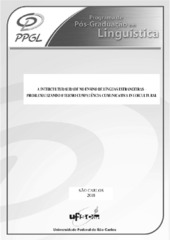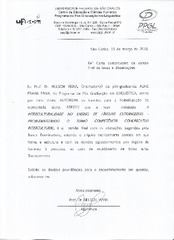Mostrar el registro sencillo del ítem
A interculturalidade no ensino de línguas estrangeiras: problematizando o termo competência comunicativa intercultural
| dc.contributor.author | Paiva, Aline Fraiha | |
| dc.date.accessioned | 2018-05-21T20:09:54Z | |
| dc.date.available | 2018-05-21T20:09:54Z | |
| dc.date.issued | 2015-10-29 | |
| dc.identifier.citation | PAIVA, Aline Fraiha. A interculturalidade no ensino de línguas estrangeiras: problematizando o termo competência comunicativa intercultural. 2015. Tese (Doutorado em Linguística) – Universidade Federal de São Carlos, São Carlos, 2015. Disponível em: https://repositorio.ufscar.br/handle/ufscar/10095. | * |
| dc.identifier.uri | https://repositorio.ufscar.br/handle/ufscar/10095 | |
| dc.description.abstract | The term interculturality is increasingly in evidence in the studies focusing mainly on the educational, political, economic and social contexts. Therefore, also in the field of foreign language teaching and learning, there are many works based on intercultural issues (Byram, 2000; Fantini, 2000; Mendes, 2004). However, it is possible to identify different approaches, and one of them which often stands out in discussions of the area is related to intercultural (communicative) competence. In this work we aim to develop a reflection on the relationship between the terms communicative competence and interculturality, in order to understand the potential uses of the term intercultural (communicative) competence and its implications, and to identify possible referrals for understanding the term interculturality in context of language teaching and learning. This Applied Linguistics research is characterized as a bibliographical, interdisciplinary and qualitative-interpretative based study. Through this research, we could understand more deeply ideas as competence, intercultural (communicative) competence and interculturality, and we have critically approached the relationship that has been established between these terms in the field of foreign language teaching and learning, especially in the context of Portuguese as a foreign/ second language. We believe that the discussions that bring out the notion of interculturality are symptoms of a society that aims to build a common horizon, so that the otherness can have its free space of expression assured. We understand, therefore, that intercultural issues should not be restricted to the level of skills/ competences in the practice of foreign language teaching. Interculturality could be understood as an invitation to reflection and action committed to the difference and the (co)experiences that take place inside and outside the classroom; a kind of driving force able to assist and guide teachers in their pedagogical planning, in the approach adopted by them to develop the communicative competence of their students, as well as in their attempt to raise students' and the other agents' awareness in the learning process for a careful and respectful attitude towards the “other”. | eng |
| dc.description.sponsorship | Não recebi financiamento | por |
| dc.language.iso | por | por |
| dc.publisher | Universidade Federal de São Carlos | por |
| dc.rights.uri | Acesso aberto | por |
| dc.subject | Ensino-aprendizagem de línguas estrangeiras | por |
| dc.subject | Competência comunicativa | por |
| dc.subject | Competência intercultural | por |
| dc.subject | Interculturalidade | por |
| dc.subject | Foreign language teaching and learning | eng |
| dc.subject | Communicative competence | eng |
| dc.subject | Intercultural competence | eng |
| dc.subject | Interculturality | eng |
| dc.title | A interculturalidade no ensino de línguas estrangeiras: problematizando o termo competência comunicativa intercultural | por |
| dc.title.alternative | Interculturality in foreign language teaching: problematizing the term intercultural communicative competence | eng |
| dc.type | Tese | por |
| dc.contributor.advisor1 | Viana, Nelson | |
| dc.contributor.advisor1Lattes | http://lattes.cnpq.br/6252579012192711 | por |
| dc.description.resumo | O termo interculturalidade apresenta-se cada vez mais em evidência nos estudos que se ocupam, principalmente, dos contextos educacional, político, econômico e social. Por esse motivo, também no campo de ensino-aprendizagem de língua estrangeira (LE) observam-se muitos trabalhos que se pautam nas questões interculturais (Byram, 2000; Fantini, 2000; Mendes, 2004). No entanto, é possível identificarmos diferentes enfoques, sendo que um frequentemente abordado nas discussões da área é o referente à competência (comunicativa) intercultural. Assim, neste trabalho temos por objetivo desenvolver uma reflexão a respeito da relação entre os termos competência comunicativa e interculturalidade, a fim de compreendermos as possibilidades de uso do termo competência (comunicativa) intercultural e suas implicações, bem como apontar possíveis encaminhamentos para a compreensão do termo interculturalidade em contexto de ensino-aprendizagem de línguas. Esta pesquisa insere-se no campo teórico da Linguística Aplicada (LA), caracterizando-se como um estudo bibliográfico, interdisciplinar e de base qualitativo-interpretativista. Por meio deste estudo, foi possível compreender com maior profundidade ideias como competência, competência (comunicativa) intercultural e interculturalidade, e questionar a relação que vem sendo estabelecida entre esses termos na área de ensino e aprendizagem de LE, especialmente no contexto de português como língua estrangeira/ segunda língua. Consideramos que as discussões que fazem emergir a noção de interculturalidade são sintomas de uma sociedade que almeja a construção de um horizonte comum para que a alteridade tenha seu espaço de manifestação livre assegurado. Entendemos, portanto, que as questões de ordem intercultural não deveriam ser restritas ao plano das competências na prática didático-pedagógica de LE. A interculturalidade poderia ser compreendida como um convite à reflexão e a ações comprometidas com a diferença, com as (con)vivências que se estabelecem em sala de aula e/ou fora dela; uma espécie de força motriz capaz de auxiliar e orientar docentes em seu planejamento pedagógico, na abordagem adotada pelos mesmos para desenvolver a competência comunicativa de seus alunos, bem como capaz de sensibilizar todos os envolvidos nesse processo para um olhar mais atento e comprometido com o “outro”. | por |
| dc.publisher.initials | UFSCar | por |
| dc.publisher.program | Programa de Pós-Graduação em Linguística - PPGL | por |
| dc.subject.cnpq | LINGUISTICA, LETRAS E ARTES::LETRAS::LINGUAS ESTRANGEIRAS MODERNAS | por |
| dc.ufscar.embargo | Online | por |
| dc.publisher.address | Câmpus São Carlos | por |
| dc.contributor.authorlattes | http://lattes.cnpq.br/9268742377116759 | por |

